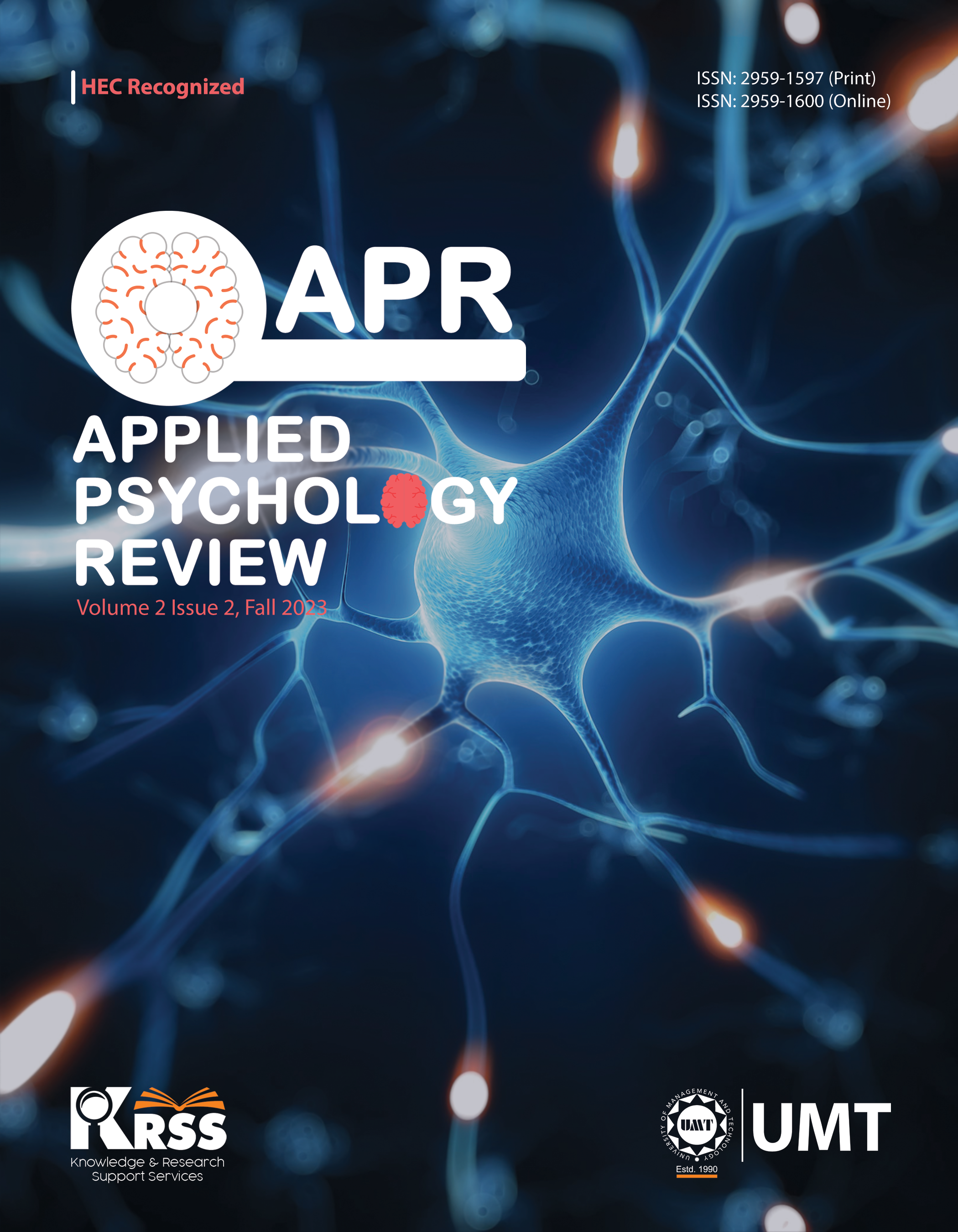Psychosocial Experiences and Coping Strategies of Young Women with Obesity
Abstract
 Abstract Views: 0
Abstract Views: 0
The current study aimed to explore the psychosocial experiences and challenges faced by young women with obesity and the type of coping strategies they use. Weight-based stigmatization is prevalent in Pakistan (Memon et al., 2019) and about 50% of the population is obese in Pakistan (Tanveer et al., 2022). In the age of technology and media, the prevalence of idealized body images has caused to internalize media representations and people’s views about obese women which are quite negative and they consider such women as incapable of doing anything (Kite et al., 2022). The study employed a qualitative research method. Semi-structured interviews were conducted using a sample of six young obese women. Interviews were analyzed using Interpretative Phenomenological Analysis which provides an in-depth and comprehensive viewpoint. A total of 33 sub-themes were extracted and five superordinate themes emerged from them. These themes include loss (self/social); psychological consequences (negative thoughts/negative emotions); concerns (physical/future); interpersonal challenges (family/ friends/ strangers), and coping strategies (adaptive/ maladaptive). The current study indicates that young women with obesity in Pakistan have various negative psychosocial experiences. The study highlights the need to introduce strategies focusing on enhancing adaptive coping among individuals experiencing stigma such as obese individuals. Additionally, it encourages community-based programs to provide awareness of and management solution for obesity to ensure well-being among these individuals.
Downloads
References
Aparicio-Martinez, P., Perea-Moreno, A. J., Martinez-Jimenez, M. P., Redel-Macías, M. D., Pagliari, C., & Vaquero-Abellan, M. (2019). Social media, thin-ideal, body dissatisfaction and disordered eating attitudes: An exploratory analysis. International Journal of Environmental Research and Public Health, 16(21), 4177–4193. https://doi.org/10.3390/ijerph16214177
Bays, H. E., Ng, J., Sicat, J., & Look, M. (2022). Obesity pillars roundtable: Obesity and East Asians. Obesity Pillars, 2, Article e100011. https://doi.org/10.1016/j.obpill.2022.100011
Blodorn, A., Major, B., Hunger, J., & Miller, C. (2016). Unpacking the psychological weight of weight stigma: A rejection-expectation pathway. Journal of Experimental Social Psychology, 63, 69–76. https://doi.org/10.1016/j.jesp.2015.12.003
Branigan, A. R. (2017). (HOW) Does obesity harm academic performance? Stratification at the intersection of race, sex, and body size in elementary and high school. Sociology of Education, 90(1), 25–46. https://doi.org/10.1177/0038040716680271
Cuzzolaro, M., & Fassino, S. (2018). Body image, eating, and weight: A guide to assessment, treatment, and prevention. Springer International Publishing.
Farrell, E., Hollmann, E., le Roux, C. W., Bustillo, M., Nadglowski, J., & McGillicuddy, D. (2021). The lived experience of patients with obesity: A systematic review and qualitative synthesis. Obesity reviews: An Official Journal of the International Association for the Study of Obesity, 22(12), Article e13334. https://doi.org/10.1111/obr.13334
Fruh, S. M., Graves, R. J., Hauff, C., Williams, S. G., & Hall, H. R. (2021). Weight bias and stigma: Impact on health. The Nursing Clinics of North America, 56(4), 479–493. https://doi.org/10.1016/j.cnur.2021.07.001
Galletta, A. & Cross, W. E. (2013). Mastering the semi-structured interview and beyond: From research design to analysis and publication. NYU Press. https://doi.org/10.18574/nyu/9780814732939.001.0001
Gerend, M. A., Patel, S., Ott, N., Wetzel, K., Sutin, A. R., Terracciano, A., & Maner, J. K. (2022). A qualitative analysis of people's experiences with weight-based discrimination. Psychology & Health, 37(9), 1093–1110. https://doi.org/10.1080/08870446.2021.1921179
Giel, K. E., Thiel, A., Teufel, M., Mayer, J., & Zipfel, S. (2010). Weight bias in work settings – A qualitative review. Obesity Facts, 3(1), 33–40. https://doi.org/10.1159/000276992
Hays, N. P., & Roberts, S. B. (2008). Aspects of eating behaviors “disinhibition” and “restraint” are related to weight gain and BMI in women. Obesity (Silver Spring), 16(1), 52–58. https://doi.org/10.1038/oby.2007.12
Hayward, L. E., Vartanian, L. R., & Pinkus, R. T. (2018). Weight stigma predicts poorer psychological well‐being through internalized weight bias and maladaptive coping responses. Obesity (Silver Spring), 26(4), 755–761. https://doi.org/10.1002/oby.22126
Janjua, M. M., Khan, A., & Kamal, A. (2022). Effect of exposure to media images on self-esteem, body esteem, and body image anxiety of college students in Pakistan. International Journal of Psychotherapy, Counselling, & Psychiatry, 28, 362-397. http://dx.doi.org/10.32598/ijpcp.28.3.4060.4
Khan, A. N., Khalid, S., Khan, H. I., & Jabeen, M. (2021). Impact of today’s media on university student’s body image in Pakistan: A Conservative, developing country’s perspective. BMC Public Health, 11(1), Article e379. https://doi.org/10.1186/1471-2458-11-379
Kite, J., Huang, B.-H., Laird, Y., Grunseit, A., McGill, B., Williams, K., Bellew, B., & Thomas, M. (2022). Influence and effects of weight stigmatisation in media: A systematic review. eClinicalMedicine, 48, Article e101464. https://doi.org/10.1016/j.eclinm.2022.101464
Laar, R. A., Shi, S., Ashraf, M. A., Khan, M. N., Bibi, J., & Liu, Y. (2020). Impact of physical activity on challenging obesity in Pakistan: A knowledge, attitude, and practice (KAP) study. International Journal of Environmental Research and Public Health, 17(21), 7802. https://doi.org/10.3390/ijerph17217802
Langford, R., Davies, A., Howe, L., & Cabral, C. (2022). Links between obesity, weight stigma and learning in adolescence: A qualitative study. BMC Public Health, 22(1), 109–118. https://doi.org/10.1186/s12889-022-12538-w
Lewis, S., Thomas, S. L., Blood, R. W., Castle, D. J., Hyde, J., & Komesaroff, P. A. (2011). How do obese individuals perceive and respond to the different types of obesity stigma that they encounter in their daily lives? A qualitative study. Social Science & Medicine, 73(9), 1349–1356. https://doi.org/10.1016/j.socscimed.2011.08.021
Memon, R. S., Shaikh, M. Y., Shaikh, A., & Ochani, R. K. (2019). Psychosocial predictors of weight bias among undergraduate students of Karachi, Pakistan. Journal of Global Health Reports, 3, Article e2019087. https://doi.org/10.29392/joghr.3.e2019087
Mosman, S. C., Poggenpoel, M., & Myburgh, C. (2015). Life stories of young women who experience rejection from their mothers. Curationis, 38(1), Article e1429. https://doi.org/10.4102/curationis.v38i1.1429
Munir, M., & Dawood, S. (2021). Weight stigma and disordered eating behaviors in Pakistani overweight adolescents: The mediating role of body esteem. Eating and Weight Disorders - Studies on Anorexia, Bulimia and Obesity, 26(6), 1939–1948. https://doi.org/10.1007/s40519-020-01038-8
Poynter, A. S. (2020). The lived experience of obesity, spirituality, and health behaviors in African American women [Doctoral dissertation, East Tennessee State University]. https://dc.etsu.edu/cgi/viewcontent.cgi?article=5330&context=etd
Rafeh, A., & Hanif, R. (2020). Understanding perception of weight stigma: Development and validation of Perceived Weight Stigmatization Scale. Pakistan Journal of Psychological Research, 34(4), 869–897. https://doi.org/10.33824/pjpr.2019.34.4.47
Randall-Arell, J., & Utley, R. (2014). The adolescent female’s lived-experience of obesity. The Qualitative Report, 19(23), 1–15. https://doi.org/10.46743/2160-3715/2014.1219
Schwartz, M. W., Seeley, R. J., Zeltser, L. M., Drewnowski, A., Ravussin, E., Redman, L. M., & Leibel, R. L. (2017). Obesity pathogenesis: An endocrine society scientific statement. Endocrine Reviews, 38(4), 267–296. https://doi.org/10.1210/er.2017-00111
Smith, J. A. (2016). Interpretative phenomenological analysis: Getting at lived experience. The Journal of Positive Psychology, 12(3), 303–304. https://doi.org/10.1080/17439760.2016.1262622
Smith, J. A., & Osborn, M. (2004). Interpretative phenomenological analysis. In G. M. Breakwell (Ed.) Doing social psychology research (pp. 229–254). The British Psychological Society and Blackwell Publishing Ltd. https://doi.org/10.1002/9780470776278.ch10
Smith, J. A., & Osborn, M. (2007). Pain as an assault on the self: An interpretative phenomenological analysis of the psychological impact of chronic benign low back pain. Psychology & Health, 22(5), 517–534. https://doi.org/10.1080/14768320600941756
Stroebe, W. (2022). The goal conflict model: A theory of the hedonic regulation of eating behavior. Current Opinion in Behavioral Sciences, 48, Article e101203. https://doi.org/10.1016/j.cobeha.2022.101203
Tanveer, M., Hohmann, A., Roy, N., Zeba, A., Tanveer, U., & Siener, M. (2022). The current prevalence of underweight, overweight, and obesity associated with demographic factors among Pakistan School-aged children and adolescents—an empirical cross-sectional study. International Journal of Environmental Research and Public Health, 19(18), Article e11619. https://doi.org/10.3390/ijerph191811619
Thomas, S. L., Hyde, J., Karunaratne, A., Herbert, D., & Komesaroff, P. A. (2008). Being ‘fat’ in today’s world: A qualitative study of the lived experiences of people with obesity in Australia. Health Expectations, 11(4), 321–330. https://doi.org/10.1111/j.1369-7625.2008.00490.x
Verstuyf, J., Patrick, H., Vansteenkiste, M., & Teixeira, P. J. (2012). Motivational dynamics of eating regulation: A self-determination theory perspective. The International Journal of Behavioral Nutrition and Physical Activity, 9, Article e21. https://doi.org/10.1186/1479-5868-9-21
Wadden, T. A., & Bray, G. A. (Eds.). (2018). Handbook of obesity treatment (2nd ed.). The Guilford Press.
World Health Organization. (2020, February 21). Obesity. https://www.who.int/health-topics/obesity
Copyright (c) 2023 Amna Shafique, Rafia Rafique

This work is licensed under a Creative Commons Attribution 4.0 International License.




